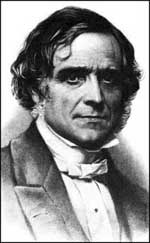Readings:
Number 21:4-9
Psalm
145
Acts 2:42-47
John
18:33-37
Preface of Baptism
[Common of a Theologian and Teacher]
[Common of a Prophetic Witness]
[Common of a Pastor]
[Of the Incarnation]
[For Rogation Days II]
PRAYER (traditional language)
Almighty God, who hast restored
our human nature to heavenly glory through the perfect obedience of our
Savior Jesus Christ: Enliven in thy Church, we beseech thee, a passion
for justice and truth; that we, like thy servant Frederick Denison Maurice,
may work and pray for the triumph of the kingdom of Christ; who liveth
and reigneth with thee and the Holy Spirit, one God, now and for ever. Amen.
PRAYER (contemporary language)
Almighty God, who has restored
our human nature to heavenly glory through the perfect obedience of our
Savior Jesus Christ: Enliven in your Church, we pray, a passion for
justice and truth; that, like your servant Frederick Denison Maurice, we
may work and pray for the triumph of the kingdom of Christ; who lives
and reigns with you and the Holy Spirit, one God, now and for ever. Amen.
Lessons revised at General Convention 2024.
Return to Lectionary Home Page
Webmaster: Charles Wohlers
Last updated: 1 February 2025
FREDERICK DENISON MAURICE
Priest and Theologian (1 April 1872)
 F
D Maurice was born in 1805, the son of a Unitarian clergyman. He studied
civil law at Cambridge, but refused the degree in 1827 rather than declare
himself an Anglican. However, he was later converted, and in 1834 was ordained
to the priesthood.
F
D Maurice was born in 1805, the son of a Unitarian clergyman. He studied
civil law at Cambridge, but refused the degree in 1827 rather than declare
himself an Anglican. However, he was later converted, and in 1834 was ordained
to the priesthood. In 1838, he published his major work, The Kingdom of Christ, a discussion of the causes and cures of divisions within the Christian Church. He was much concerned with the role of the Church in speaking to social questions, speaking of "faith in a God who has redeemed mankind, in whom I may vindicate my rights as a man." Together with his friends John Ludlow and Charles Kingsley, he organized the Christian Socialist Movement, which, he wrote, "will commit us at once to the conflict we must engage in sooner or later with the unsocial Christians and unchristian Socialists." His work is one of the reasons why Socialism in England has been largely devoid of the avowedly anti-Christian overtones it had in many other countries. (In the late 1940's the majority of the members of the British Cabinet, then organized under the Labor Party, met regularly under the leadership of Sir Stafford Cripps, the Chancellor of the Exchequer, for prayer, Bible study, and discussion of the application of Christian principles to public life.)
Soon after his ordination, Maurice became Professor of English Literature and History at King's College, London, and in 1846, Professor of Theology as well. However, his book Theological Essays, published in 1853, was regarded by many readers as doubtfully orthodox, and the resulting furor cost him his professorships. In 1854, he founded the Working Men's College, and became its first head. He was professor of Moral Theology at Cambridge from 1866 until his death in 1872.
A friend of mine, who has read considerably more of Maurice than I have, says of the Theological Essays: "Maurice has a sneaky approach. He begins an Essay by considering an objection to traditional Christian theology: for example, the objection that the instructions supposedly given by God to the Israelites to massacre the inhabitants of Canaan are morally indefensible. He begins by conceding his opponent's assertion, by granting that indeed it is preposterous to suppose that God would ever do anything of the kind. He then invites his opponent to consider how it is that we come to believe that the wholesale slaughter of defeated opponents in war is wrong. (A glance at any history of the Pelopennesian War, by Thyucidides or another, will make it clear that the Ancient Greeks did not share this view.) He explores with his opponent the question of the role of Israel in the moral and spiritual development of mankind -- the implications of the fact that the overwhelming majority of those who believe that it is wrong to slaughter a defeated people originally got that idea from sources traceable back to the religious ideas of the ancient Israelites. He points out that, if there is a God and He has revealed Himself, there is reason to suppose that the history of Israel is a part of that revelation. And by the time he is done, he has won more territory than he appeared at first to be losing."
That, at any rate, is what he finds in Maurice. Other readers give different reports that leave me wondering whether they have read the same author.
by James Kiefer
Several of his sermons and
meditations are
online, thanks to Project Canterbury.